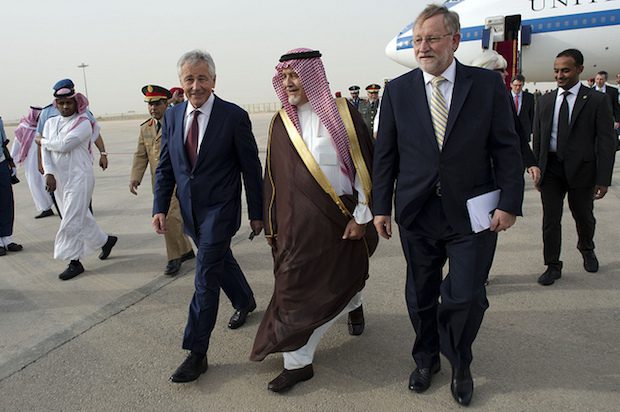Obama Bombs Blind

By bombing ISIS units in Syria, the United States has turned a new page in its long-running conflict with the Arab world. I share the pessimism of those who predict the bombing won’t work, in which case this president or the next will come under intense pressure to commit ground troops in order to avoid a humiliating defeat. American allies in the region, who might be expected to contribute ground troops to the fight, have all refused—though jet planes from “several Arab allies” did strike targets in Syria. Presumably that’s an improvement over the Iraq invasion: the regional disdain for “Operation Iraqi Freedom” was perhaps best captured in a priceless scene from Oliver Stone’s “W.”, in which the Condoleeza Rice character tells the President that Morocco has promised to contribute thousands of monkeys to aid the American war effort.
Nathan Brown’s article in Monday’s Washington Post conveys a sense of the region’s ideological and political complexity in a period of great flux and despair—and how little it is understood in Washington. But armed with our ignorance, we are embarking on a multi-billion dollar campaign that will kill thousands of people—most of them, quite innocent—for reasons we have not thought through at all. Indeed, there seems to be something like an official government policy on not asking too many questions. For instance, we all seem to understand the thread leading from 9/11 to the Iraq invasion, to the creation of ISIS from the remnants of Saddam’s army. But where does the thread actually begin?
I recently read The Eleventh Day, a gripping book by Anthony Summers and Robbyn Swann on the 9/11 attacks. It’s a detailed account of what happened that day, based on painstaking analysis of the known record, including hundreds of interviews carried out by the authors and others. (For what it’s worth, it’s not a “truther”-friendly book.) One point which emerges very powerfully is the many layers of interaction between our Mideast ally Saudi Arabia and bin Laden, al-Qaeda, and the 9/11 hijackers. A substantial part of the Saudi ruling family is “bin Ladenist”—perhaps not surprising for a group with piles of money and no responsibility, almost invariably a recipe for bad behavior. Not only were most of the hijackers Saudis, but Bin Laden raised most of his money through Saudi charities and individuals. These observations are included in the publicly released 9/11 Commission report. Not included are some more specific points, including facts which raise the possibility that two of the hijackers were in rather more direct contact with and given substantial assistance by officials affiliated with the Saudi embassy. Many of the loose threads are gathered up and detailed in a 28-page segment of the 9/11 Commission report.
Curiously, President Bush ordered those 28 pages classified, so that no one without extremely rare security clearances could read them. Former Senator Bob Graham of Florida is one person who has read them, and who then pressed hard for deeper investigation of the Saudi role. Said Graham, pondering Bush’s role in keeping the Saudi information under wraps: “It’s as if the President’s loyalty lay more with Saudi Arabia than with America’s safety.” Obama promised to release the classified material shortly after his inauguration, but has not done so. One official who read the classified material is quoted by Summers and Swann: “If the twenty-eight pages were to be made public, I have no question that the entire relationship with Saudi Arabia would change overnight.”
There is a presently a House bill to declassify the 28 pages, introduced by Walter Jones and Stephen Lynch; it is bipartisan and now has 17 cosponsors. Perhaps the ISIS crisis will generate some curiosity about what those pages say.
The boots on the ground component of Obama’s anti-ISIS campaign involves the training of “vetted” Syrian rebels in Saudi Arabia. Clearly the Saudis are playing a complicated game—training the anti-ISIS rebels, perhaps out of fear that their own population might be attracted by ISIS. Is it possible, or likely, that Saudi princes have been helping to finance ISIS? It would be hard to see why not. But while Americans know the crux of the president’s current anti-ISIS strategy involves close cooperation with the Saudi regime, might they also ask whether this involves cooperation with Saudis whom some (those who have seen the classified report) believe were engaged in financing and assisting the 9/11 hijackers? That’s what this administration, like the last one, doesn’t want you to speculate about.
The famous Founding Fathers’ warnings against entangling alliances are often considered pertinent for America’s ties to Israel, and of course they are: one point Summers and Swann make is that all of Saudi Arabia—from the top government ministers to the 9/11 hijackers—was enraged and repulsed by Israel’s treatment of the Palestinians and America’s complicity in it. (This fact was considered but watered down in the 9/11 official report, out of fear that it might cause some to question the value of the “special relationship” with Israel.) But it seems obvious that a Saudi “special relationship” may be just as detrimental to America’s real interests. In any case, it should be up for discussion. For starters, before we bomb anyone, let’s unclassify the 28 pages of the 9/11 report, and discuss the nature of our ties to Saudi Arabia. Then we can decide how much to rely on Saudi Arabia as our principle Muslim ally in combatting ISIS.
Or perhaps we should just go ahead and bomb first, then ask questions about who or why later. The Obama administration has already made its choice.
Scott McConnell is a founding editor of The American Conservative.